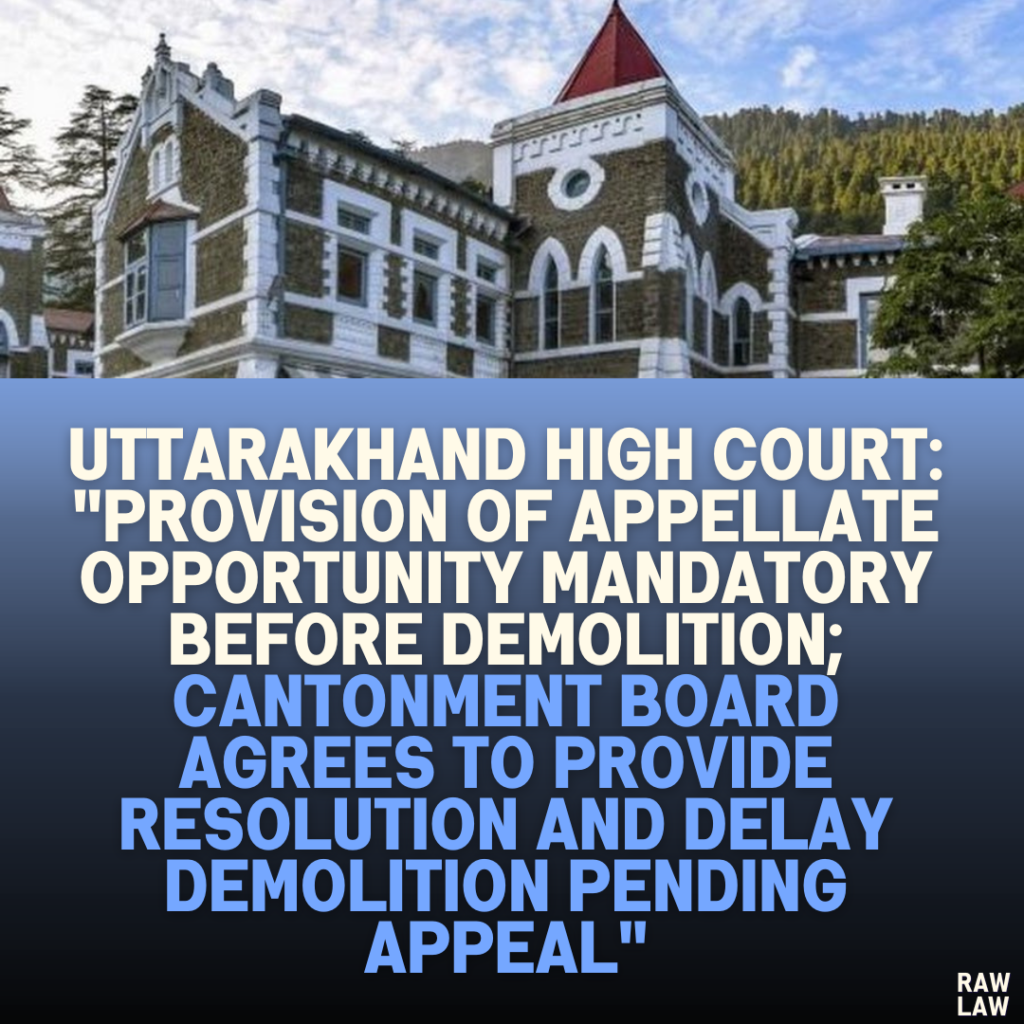Court’s Decision:
The Uttarakhand High Court disposed of the writ petition with mutual consent from both parties. The respondent, Cantonment Board Ranikhet, agreed to:
- Provide the petitioner a copy of the disputed resolution dated 19.10.2024 within 24 hours.
- Grant the petitioner ten days to challenge the resolution before the Appellate Authority as per Section 340 of the Cantonments Act, 2006.
- Not proceed with demolishing the petitioner’s construction during this ten-day period.
The court directed the matter to be resolved through the appellate mechanism outlined in the Cantonments Act, thereby safeguarding the petitioner’s rights.
Facts:
- The petitioner, a resident in Ranikhet, constructed a house on Survey No. 218 based on a sanction letter dated 21.06.2018.
- On 18.11.2024, the respondent issued a notice deeming the house illegal, citing a resolution passed on 19.10.2024 by the Cantonment Board.
- The notice gave the petitioner one week to voluntarily demolish the construction; otherwise, the respondent threatened to demolish the structure with police assistance.
- The petitioner claimed that the resolution was not provided to him, nor was he given an opportunity to be heard before the resolution was passed.
Issues:
- Procedural Fairness: Did the respondent violate the principles of natural justice by not granting the petitioner an opportunity to be heard before issuing the notice based on the resolution?
- Legal Validity of the Notice: Was the demolition notice lawful when the petitioner was not provided with the resolution that formed the basis of the decision?
Petitioner’s Arguments:
- Sanctioned Construction: The petitioner argued that the house was constructed lawfully under the sanction letter issued by the Cantonment Board in 2018.
- Violation of Natural Justice: The notice dated 18.11.2024 was challenged as illegal because the resolution dated 19.10.2024, forming the basis of the notice, was passed without the petitioner being heard or provided a copy of the resolution.
Respondent’s Arguments:
- Procedural Steps: The respondent’s counsel, on instructions, assured the court that the petitioner would be provided a copy of the resolution within 24 hours.
- Appellate Remedy: The petitioner was informed that he had the right to appeal the resolution under Section 340 of the Cantonments Act, 2006, and was granted ten days to file such an appeal.
- No Immediate Demolition: The respondent confirmed that no action to demolish the petitioner’s building would be taken within the ten-day period provided for filing an appeal.
Analysis of the Law:
- Cantonments Act, 2006: Section 340 provides an appellate mechanism for individuals aggrieved by decisions of Cantonment Boards, ensuring an opportunity to challenge such resolutions.
- Principles of Natural Justice: Administrative actions affecting an individual’s rights must follow due process, including providing a hearing and a chance to contest decisions before enforcing adverse consequences.
- Procedural Irregularity: By not providing the petitioner with a copy of the resolution or the opportunity to be heard before issuing the demolition notice, the respondent acted in contravention of these principles.
Precedent Analysis:
No previous judgments were cited in this case. However, the court’s decision aligns with established jurisprudence that emphasizes procedural fairness and natural justice in administrative actions.
Court’s Reasoning:
- The court acknowledged the petitioner’s grievance regarding the lack of access to the resolution and opportunity to be heard.
- The respondent’s agreement to provide the resolution and delay demolition until the petitioner could file an appeal ensured procedural fairness.
- By directing adherence to the appellate mechanism under Section 340 of the Cantonments Act, the court ensured the petitioner’s rights were protected while allowing the respondent to pursue lawful procedures.
Conclusion:
The writ petition was disposed of based on mutual consent:
- The respondent would supply the resolution to the petitioner within 24 hours.
- The petitioner was given ten days to challenge the resolution before the Appellate Authority.
- The respondent agreed not to take demolition action during this period.
Implications:
- Reinforcement of Natural Justice: The judgment underscores the requirement for administrative bodies to follow principles of fairness before taking coercive actions like demolition.
- Appellate Rights: It highlights the importance of providing access to appellate mechanisms in statutory frameworks, ensuring affected parties have an opportunity to contest decisions.
- Safeguarding Rights: The court’s directions prevent arbitrary actions by administrative authorities, thereby safeguarding individual rights against improper procedural practices.
This decision serves as a reminder for public authorities to ensure procedural compliance and fairness in their decision-making processes.




Pingback: Gauhati High Court Mandates Recalculation of Pension: "Full Service Tenure from Initial Appointment to Superannuation Must Be Considered for Pensionary Benefits" - Raw Law